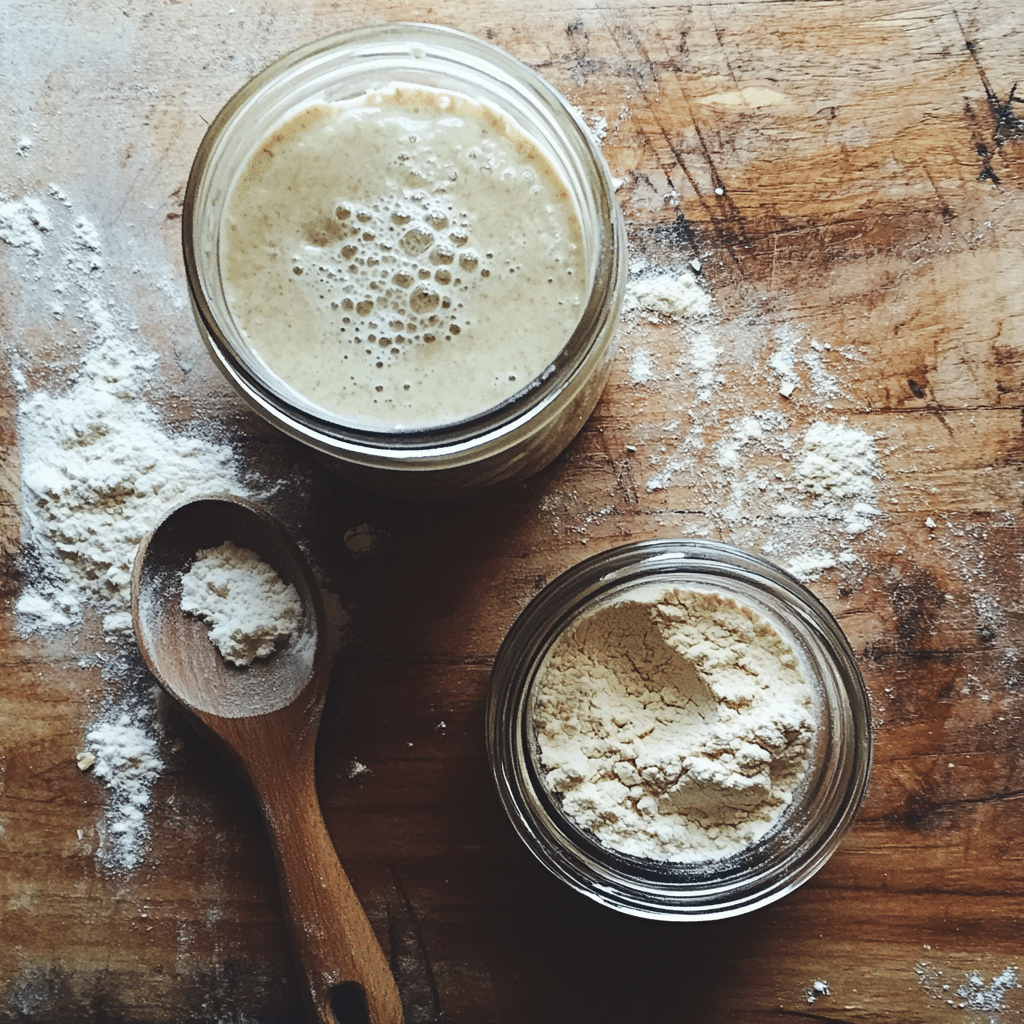Before we dive in, this article explores why sourdough might just be your healthiest bread choice. We’ll uncover its gut-friendly properties, anti-inflammatory effects, and whether it’s truly a better carb. I’ll also share my personal sourdough story, offer evidence-backed info, and include helpful links from across QuickUSARecipe to enrich your reading. Whether you’re health-curious or carb-conscious, this sourdough health benefits guide is your go-to reference.
Real Stories Behind the Sourdough Craze
From Disappointment to Devotion: My First Slice
The first time I baked with a sourdough starter, I was trying to impress a date. The bread came out flat, dense, and tragic. The date ghosted me—but that loaf sparked something deeper. That failure was the start of a love story between me and sourdough. Years later, I’m still mixing, folding, and teaching—now from my cozy bakery, “Marlene & Crumb,” in Mendocino, California.
This sourdough health benefits guide grew out of that obsession. I wanted to know: is sourdough actually better for you? It turns out, yes. Properly fermented sourdough helps reduce phytic acid (which blocks mineral absorption) and breaks down gluten and starches in a way that makes bread more digestible. This traditional bread isn’t just nostalgic—it’s nourishing.
The Surprising Benefits of a Slow Rise
When I started teaching sourdough workshops across the U.S., I met dozens of folks who had given up bread—until they found sourdough. They shared stories of feeling better, less bloated, even energized. That’s when I began writing this sourdough health benefits guide to help people understand the ‘why’ behind the wellness.
Unlike most commercial loaves, sourdough undergoes a natural fermentation process. That means beneficial bacteria like Lactobacillus thrive and help produce lactic acid—known to support gut health and reduce inflammation. So, when someone asks me, “Is sourdough really good for you?” I point them to both science and experience.
This sourdough health benefits guide will walk you through every claim, every myth, and every crumb of truth.

Can Sourdough Really Support Your Gut Health?
Gut-Friendly Fermentation: The Real MVP
If you’ve ever felt weighed down or bloated after eating bread, you’re not alone. But one of the biggest reasons people are turning to sourdough is because it’s easier on the gut. This section of our sourdough health benefits guide dives deep into what makes sourdough a potential hero for digestion.
The secret lies in the fermentation. During the slow rise, wild yeasts and lactic acid bacteria (like Lactobacillus) go to work. These microbes break down gluten and starches, making the final product gentler on your system. They also lower the bread’s pH and produce compounds that encourage the growth of healthy gut flora. That’s why many people who struggle with regular wheat bread often tolerate sourdough just fine.
Plus, sourdough can reduce phytic acid—the compound in grains that can block mineral absorption. Fewer blockers mean your body gets more of the good stuff: magnesium, zinc, iron. It’s not a cure-all, but sourdough can certainly play a role in digestive wellness.
Sourdough and Inflammation: Separating Fact from Hype
Another reason people reach for sourdough? Inflammation. This sourdough health benefits guide wouldn’t be complete without talking about how bread might affect chronic inflammation.
When properly fermented, sourdough creates fewer blood sugar spikes, which is a big deal for inflammation control. Stable blood sugar means less insulin release, and over time, less systemic inflammation. The fermentation also reduces FODMAPs—fermentable sugars that cause gas and irritation for many people with IBS.
While more research is needed, early studies suggest that the microbial balance in sourdough could offer anti-inflammatory benefits.
In short, your gut might just thank you for that slice of tangy, chewy goodness.

Is Sourdough a Good Carb or a Sneaky One?
Let’s Talk Carbs (But Not Fear Them)
Carbs have taken a beating in the health world, but not all carbs are created equal. In this sourdough health benefits guide, one question always pops up: “Is sourdough a good or bad carb?” Here’s the good news—it can be a smart one, especially when compared to white or even whole wheat breads.
Sourdough ranks lower on the glycemic index (GI) than most conventional breads. That means it causes a slower, more controlled rise in blood sugar. Why? Fermentation changes the bread’s structure by breaking down starches and producing organic acids that slow glucose absorption. That’s not diet marketing—that’s microbiology in action.
For those tracking blood sugar, managing pre-diabetes, or just aiming for stable energy, sourdough can be a surprisingly supportive staple. Pair it with a healthy fat like avocado or nut butter, and you’ve got a blood-sugar-friendly breakfast that keeps you fueled and focused.
The Carb Conversation: Quality Over Quantity
Instead of asking “Are carbs bad?” we should be asking, “What kind of carbs am I eating?” In this sourdough health benefits guide, we highlight how real food, fermented naturally, often beats out anything ultra-processed—especially in how it affects your metabolism.
Not only does sourdough offer fiber and micronutrients, it’s also more satisfying, meaning you may eat less without trying. That satiety is something even calorie-counters can appreciate.
Sourdough might be a carb—but it’s a complex one, in all the best ways.
How Sourdough Compares to Other Breads
The Better Bread Debate: Sourdough vs. the Rest
In this sourdough health benefits guide, we’ve explored how sourdough supports your gut, helps regulate inflammation, and earns its place as a “good carb.” But how does it compare to other bread types? Let’s break it down.
White bread is typically fast-fermented, low in nutrients, and high in sugar-spiking starch. Whole wheat bread is better but often contains added gluten and stabilizers. Meanwhile, gluten-free bread, while helpful for celiac sufferers, is frequently made with ultra-processed flours and lacks fermentation benefits.
Sourdough, on the other hand, is unique because it’s alive—made with a starter of wild yeast and bacteria that transform the dough over hours (or even days). This extended fermentation enhances bioavailability of nutrients, helps neutralize antinutrients like phytic acid, and promotes better digestion. It’s less about “low-carb” and more about high-function.
Is Sourdough for Everyone? The Final Slice
No food is perfect for every person—but this sourdough health benefits guide exists because this bread comes pretty close. It’s not just about nostalgia or flavor (though those are reason enough). Sourdough is a result of microbial teamwork—one that transforms flour and water into something digestible, resilient, and deeply satisfying.
For people sensitive to gluten or carbs, sourdough may offer a better option. Still, it’s important to note that true sourdough is slow-fermented, not just labeled so. Always check your bakery—or better yet, bake it yourself.
Sourdough isn’t a fad. It’s a fermentation legacy—and it’s here to feed more than just your appetite.

FAQ: Sourdough Health Benefits Guide
Is sourdough bread actually healthier?
Yes, sourdough bread is generally considered healthier than most commercial breads. Thanks to its natural fermentation process, it contains more bioavailable nutrients, has a lower glycemic index, and is easier to digest. This means your body absorbs more vitamins and minerals while experiencing fewer blood sugar spikes.
Can sourdough heal your gut?
Sourdough can support gut health, though it’s not a “cure” for digestive conditions. The fermentation process introduces beneficial bacteria and helps reduce antinutrients like phytic acid. Many people with mild gluten or IBS sensitivities report fewer symptoms when switching to real sourdough.
Is sourdough bread less inflammatory?
Compared to processed white or wheat breads, sourdough may be less inflammatory. The lower glycemic load and reduced FODMAP content help stabilize blood sugar and minimize digestive irritation—both key factors in lowering inflammation levels over time.
Is sourdough a good or bad carb?
Sourdough is a smart carb. It’s fermented, complex, and rich in fiber and micronutrients. While it still contains carbs, its slow digestion and improved nutrient absorption make it a better choice for those managing blood sugar, cravings, or general health.
Conclusion: Your Daily Bread Can Be a Daily Boost
Whether you’re looking to ease digestion, reduce inflammation, or just enjoy bread again without guilt, this sourdough health benefits guide offers strong reasons to give it a try. With centuries of tradition and modern science backing it, sourdough stands apart from factory-made loaves.
The key takeaway? Healthier bread doesn’t have to be boring or bland. In fact, it can be tangy, toasty, and teeming with natural goodness. And with simple ingredients like flour, water, salt—and a little patience—you can bake a better body, one loaf at a time.

